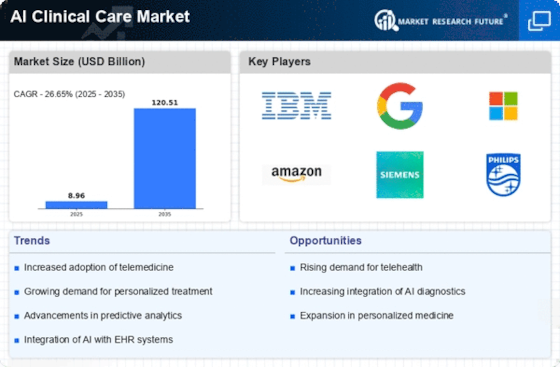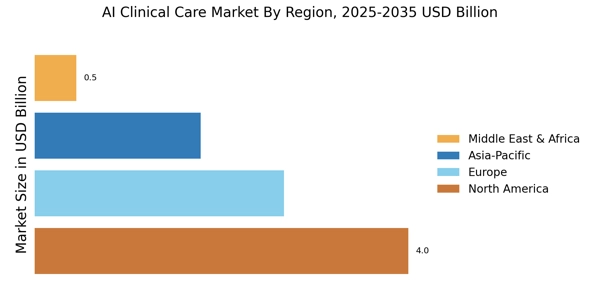Advancements in AI Technologies
The continuous advancements in AI technologies play a pivotal role in shaping the AI Clinical Care Market. Innovations in machine learning, natural language processing, and predictive analytics are enhancing the capabilities of AI systems in clinical settings. These technologies enable healthcare professionals to analyze vast amounts of data swiftly, leading to improved decision-making processes. For instance, AI-driven diagnostic tools are becoming increasingly accurate, with some studies indicating a diagnostic accuracy rate exceeding 90% in certain conditions. This technological evolution not only streamlines workflows but also enhances patient safety and care quality. As these advancements proliferate, the AI Clinical Care Market is likely to witness accelerated adoption rates across various healthcare sectors.
Regulatory Support for AI Integration
The AI Clinical Care Market is benefiting from increasing regulatory support aimed at facilitating the integration of AI technologies in healthcare. Regulatory bodies are establishing frameworks that promote the safe and effective use of AI in clinical settings. This support is crucial as it addresses concerns related to data privacy, security, and ethical considerations. Recent initiatives have streamlined the approval processes for AI-driven medical devices and software, encouraging innovation while ensuring patient safety. As regulations evolve to accommodate AI advancements, healthcare providers are more likely to adopt these technologies, thereby driving growth in the AI Clinical Care Market. The alignment of regulatory frameworks with technological progress is expected to foster a conducive environment for AI integration in clinical care.
Rising Demand for Telehealth Solutions
The AI Clinical Care Market experiences a notable surge in demand for telehealth solutions, driven by the increasing need for remote patient monitoring and consultations. As healthcare providers seek to enhance accessibility and efficiency, AI technologies are being integrated into telehealth platforms. This integration allows for real-time data analysis and personalized patient care, which is crucial in managing chronic diseases. According to recent data, the telehealth market is projected to reach a valuation of over 250 billion dollars by 2027, indicating a robust growth trajectory. The AI Clinical Care Market is poised to benefit significantly from this trend, as AI algorithms improve diagnostic accuracy and patient engagement, ultimately leading to better health outcomes.
Increased Investment in Healthcare AI Startups
The AI Clinical Care Market is witnessing a surge in investment directed towards healthcare AI startups. Venture capital funding has significantly increased, with investments reaching approximately 10 billion dollars in the last year alone. This influx of capital is fostering innovation and the development of cutting-edge AI solutions tailored for clinical applications. Investors are particularly interested in startups that focus on AI-driven diagnostics, treatment planning, and patient management systems. The competitive landscape is evolving as these startups introduce novel technologies that challenge traditional healthcare practices. Consequently, the AI Clinical Care Market is likely to expand rapidly, driven by the innovative solutions emerging from this vibrant startup ecosystem.
Growing Emphasis on Data-Driven Decision Making
The AI Clinical Care Market is increasingly influenced by the growing emphasis on data-driven decision making within healthcare organizations. As healthcare providers recognize the value of data analytics, they are adopting AI solutions to harness insights from patient data. This shift enables more informed clinical decisions, enhances operational efficiency, and improves patient outcomes. Reports indicate that healthcare organizations utilizing AI for data analysis have experienced a reduction in operational costs by up to 30%. Furthermore, the integration of AI in clinical workflows allows for predictive modeling, which can anticipate patient needs and optimize resource allocation. This trend underscores the importance of AI technologies in the evolving landscape of the AI Clinical Care Market.

















